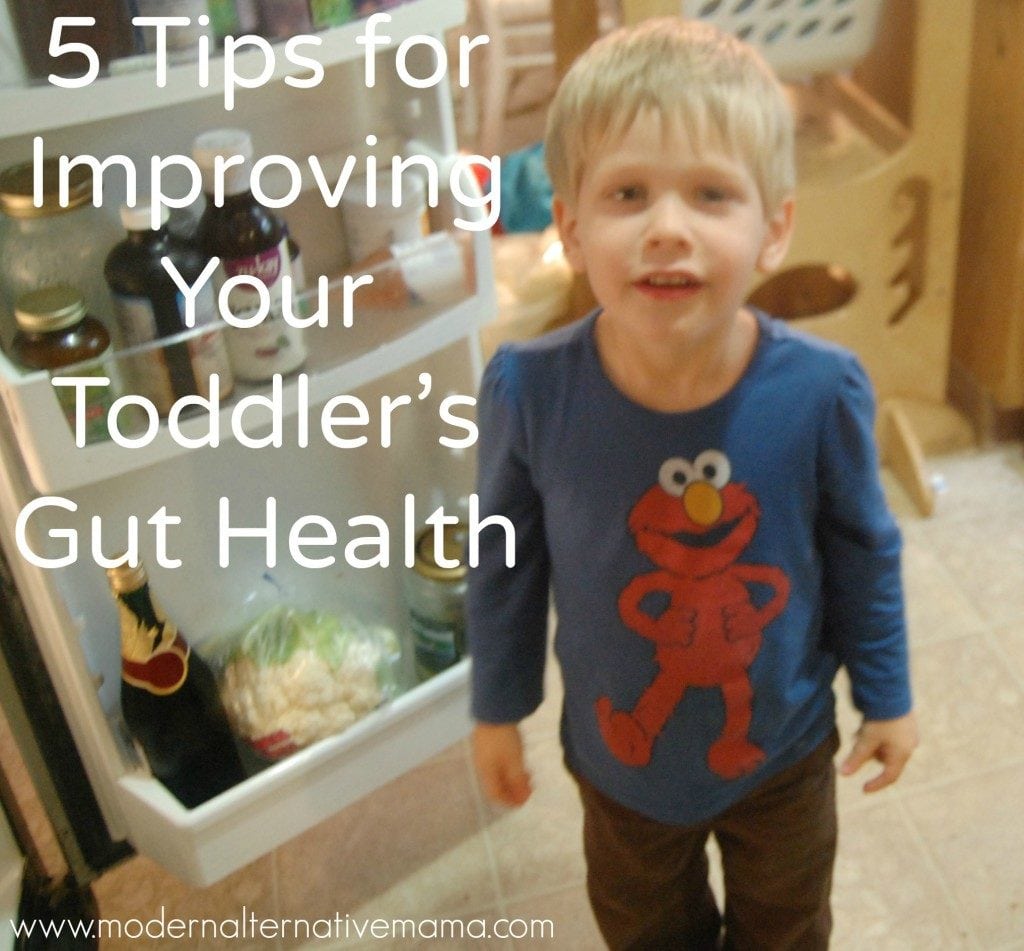Recently, I’ve been talking a lot about gut flora, especially in children. A couple weeks ago, I wrote “5 Ways to Help Your New Baby Develop Optimal Gut Flora.” That’s a great read, especially if you have a young baby (who hasn’t yet started solids), but what about toddlers?
A lot of us — myself included — learned a lot about gut flora after our kids were born and older. In fact, I was first clued in to what gut flora even was when my oldest was struggling with food allergies starting around a year old. I was thrown into the world of natural health, got a crash course in healthy eating and gut flora, and spent the next several years learning everything I could about how to encourage health naturally.
Gut flora is pretty important. And yes, we want to get it started off right, from the very beginning, if at all possible. Still, most of us do find out about the importance of gut flora after the newborn phase, for ourselves and for our older children. So we need to know how we can encourage healthy gut flora later, too.
Today we’re talking toddlers. They’re still pretty “flexible” in some ways — their gut flora is pretty well-established but they are also still growing and developing their food preferences. There’s a lot we can do to encourage healthy gut flora!
5 Tips for Improving Toddlers’ Gut Health
There’s been some fascinating newer research recently. One study shows that the composition of a toddler’s gut flora may impact their behavior and personality traits! Anecdotally, I’ve noticed my kids’ behavior changing depending on what they eat or whether or not they take probiotics.
So! There are definitely things you can do to improve your toddler’s gut flora. And which you definitely should do. 🙂
1. Eat Fermented Foods
The most important thing we can do for gut flora is to consume fermented foods — preferably, a wide variety. In general, most people do not eat enough fermented foods. Fermented foods include yogurt, milk kefir, water kefir, kombucha, sauerkraut, pickles, kimchi, and more. Several companies make juice drinks and other foods that contain probiotics now, too. Most people can find at least a couple probiotic foods that they like. If all else fails, add yogurt or milk kefir to a smoothie!
My toddlers and older kids like yogurt, kombucha, and pickles the best.
2. Offer Probiotic Supplements
Some toddlers are picky eaters — interestingly, poor gut flora can cause or contribute to picky eating! This means they may not eat fermented foods much or at all, making it difficult to get probiotics into them. Instead, try a supplement. I recently discovered this one, which I bought for my kids. They really like it and it’s easy to take — and it’s supposed to be stronger than most. I also really like this one.
3. Play in the Dirt…and with Animals
Believe it or not, your child’s playing habits can affect his/her gut flora! Playing outside on the farm and being exposed to farm animals and dirt has been associated with lower levels of asthma and eczema (source). This helps to improve gut flora because of the diverse microbiome found on the animals, and in the soil. Plus, if your child can drink raw milk from a healthy farm, that is also associated with improved health and lower risk of asthma!
4. Eat Prebiotic Foods
Unlike an infant, a toddler is eating a wide variety of foods. What we eat has a lot to do with our gut health, and certain foods encourage healthy gut flora, and other foods discourage it.
Prebiotic foods, especially those that contain certain types of fiber, are beneficial. Onions, beans, garlic, most veggies, low-sugar fruits, whole grains (oats, wheat, barley, rice, etc.), apples and bananas are good sources of prebiotics. Offer these as snacks — most kids really like the fruits and would enjoy homemade granola bars with wheat and oats also.
It’s best to avoid processed foods, refined sugar, GMOs, etc. as these can kill healthy bacteria and feed bad bacteria.
5. Avoid Antibacterial Products and More
Whenever possible, avoid things that kill gut flora. This includes antibacterial soap, antibiotics, and more. Obviously antibiotics are occasionally necessary, but not nearly as often as we think they are. We choose to address ear infections, sinus infections, and other minor health issues naturally and have not needed to use antibiotics. They are especially dangerous in the first year of life but are never a good thing — even if needed they can and do cause collateral damage. (And if they’re needed then you need to do extra probiotics and prebiotics and strictly no sugar to encourage re-growth of healthy bacteria after.)
These tips apply to older kids and adults, too. Having healthy gut flora is not easy in a world filled with pesticides, herbicides, processed foods, and more. Increasingly, we are finding out that this “hyper sterile” world is really bad for our healthy in the long run. Encouraging exposure to healthy sources of bacteria is one of the best things we can do.



HI I HAVE A 6 YEAR OLD WITH A CAVITY THAT I WOULD LIKE TO HEAL. AND I ALSO WANT TO KEEP MY KIDS HEALTH. ANY TIPS PLEASE.
Hi, I’m very interested in balancing my kids’ gut flora. They all 3 have always had excema, cradle cap & my 3rd bad diaper rashes. They’ve always had several veggies & little to no sugar. I am ordering the probiotic you recommended. This year they have just finally found a love for playing outside. They are 7; 6; & 1. I may order the MTHFR Saliva test bc I don’t know where we’re at on that but what else should I be doing? I feel like it’s not enough